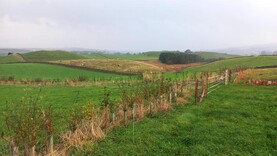The extent and level of cuts to lamb prices by factories over the past number of weeks must stop, Irish Farmers' Association (IFA) national sheep chair Adrian Gallagher has said.
He was speaking on Friday following a meeting of the IFA national sheep committee, which is comprised of sheep farmers elected by members from every county in the country.
“Members reflected the huge anger, frustration and despondency of sheep farmers at the depth and speed of the price cuts exerted by factories on lamb prices - cuts of over 20% or nearly €40/lamb in the space of just a few weeks," he said.
It is obvious, he added, that prices in the UK are following a similar pattern, but this is little consolation to sheep farmers who operate in an extremely low-income vulnerable sector, where the capacity to absorb this type of volatility simply does not exist.
Future on a knife edge
He said the future of the sector is very much on a knife edge, as is evident from the recent census figures published for 2023 which show a drop in all key numbers.
The number of farms keeping sheep dropped by over 1,000, the number of breeding ewes dropped by 3.7% and the overall number of sheep were down 7%.
“The severity of the price cuts is only adding to this exodus, with commercial sheep farmers in the main not having benefited from the historically high prices paid for hoggets earlier in the year.
"As they come to selling their lambs, they are facing into prices, which, at best, are similar to last year. This will have consequences for breeding decisions on these farms and will impact supplies for next year."
Gallagher said factories need to wake up to the reality that sheep farmers will not keep working for nothing and we are not far away from these factories not having a consistent year-round supply of lambs for processing.
Bord Bia also has a huge role to play and must immediately get on the pitch with a targeted and intensive marketing campaign for lamb, said Gallagher.
'Badly let down'
The IFA chair said sheep farmers have been badly let down by trade agreements at EU level allowing increased access for sheepmeat from the southern hemisphere on to our market, a situation compounded by Brexit, where trade deals agreed by the UK are allowing additional product in from these regions.
“The food regulator must address the lack of transparency in the food supply chain for sheepmeat. We know what farmers get for lamb, we know what consumers pay for our lamb, but there is no visibility of what all other players between the farmgate and the consumer gets.
"This recent slashing of farmgate lamb prices has yet again highlighted the need for the regulator to provide this transparency. Farmers’ prices are back over 20%, but we are not seeing similar price reductions on the supermarket shelves,” he said.
This volatility in the marketplace, he said, further highlights the need for strong and meaningful direct supports for the farmers who put the time, money and labour into lambing ewes.
€8/ewe
Minister for Agriculture Charlie McConalogue must extend the €8/ewe national exchequer sheep scheme for 2025 and build on it to bring total direct supports for ewes to €30/ewe when combined with the SIS payment.
Friday’s meeting of the IFA sheep committee also called for the urgent convening of the Food Vision sheep group to commence work on developing a framework that will support the long-term viability and sustainability of the sheep sector.
The IFA sheep chair will be leading a delegation of committee members in meetings with the factories in the coming days.






 This is a subscriber-only article
This is a subscriber-only article










SHARING OPTIONS: